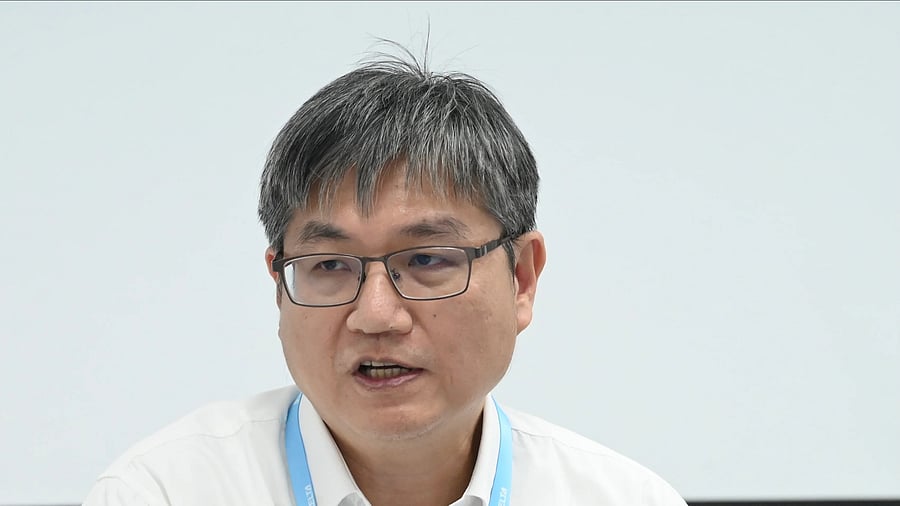
Credit: Special arrangement.
With the rapid growth of the EV sector, Taiwan’s Delta Electronics anticipates rising demand from original equipment manufacturers (OEMs) and is expanding capacity at its plant in Kurubarapalli, Krishnagiri district.
Chief Minister M K Stalin laid the foundation stone for two new facilities on September 11, with an investment of Rs 450 crore.
Speaking DH’s ETB Sivapriyan, the company’s president, Benjamin Lin, elaborates about the company’s plans, including local supplier development and increasing local raw material sourcing, as well as India’s expanding EV market. Edited excerpts:
How has Delta Electronics’ portfolio in India evolved over the last two decades?
Delta entered India in 1996. In the first decade, we focused mainly on power electronics, especially for the telecom sector and UPS systems. In the second decade, we expanded into photovoltaic (PV) solar and renewable energy applications. Presently, we are entering the EV charging solutions market and providing high-power applications.
Yes, you are betting big on India’s EV drive. How is that going?
It is progressing very well, as the government’s EV mission is crucial for us and the boost from consumers is also encouraging. The growth in two-wheelers is especially exciting, and four-wheelers are also increasing rapidly.
We are working closely with leading OEMs to understand their requirements and develop products specifically for India. We aim to capture about 40% of the segment’s market share in the next five years.
Since we understand the Indian market is different, we leverage our R&D centre in Bengaluru to address local needs. We also have joint ventures with Musashi and Toyota from Japan, and a German firm. This collaboration will help us build better products for the Indian market.
What are your indigenisation plans? Will you buy from local MSMEs or bring in your established suppliers to India?
Currently, the charging station ecosystem in India remains underdeveloped, so we mainly source from overseas suppliers or within Delta’s internal ecosystem. The good news is that we have begun purchasing locally and are committed to sourcing most materials within India.
For telecom power products, over 50% of components are now made locally, and we see a similar trend with some products in our electronics portfolio. Local sourcing reduces costs and ensures timely deliveries to customers.
Leveraging our global experience in China, Taiwan, and Thailand, we bring worldwide expertise to India. Our supplier ecosystem will be a mix of overseas and domestic players. Since domestic suppliers have a better understanding of the market, we prefer them wherever possible.
When do you expect suppliers to set up locally, reducing your costs?
The recent US tariff dispute may impact our plans. While the situation remains fluid and I cannot offer a precise timeline, our original plan aims for full utilisation within three years. Building an ecosystem depends on volumes, as well as suppliers require clear volume commitments. We are actively pushing them to set up operations locally.
With India advancing indigenous chipmaking and Prime Minister Narendra Modi recently unveiling the first locally produced chip, what role do you see for Delta Electronics?
We are part of the semiconductor manufacturing ecosystem. Fabs need reliable power backup, and in Taiwan, most semiconductor firms use Delta’s power solutions for UPS and data centres. As India’s semiconductor industry matures, we hope to source ICs and chips produced locally.
You have pledged approximately $500 million in investment in India over the next decade. When will this come through?
Our pledged investment in India will be fully deployed by September 1, 2027. Around half is directed towards manufacturing expansion, while the remainder supports housing, supplier ecosystem development, and environmental initiatives.
You are also investing heavily in charging solutions for mass transport, such as buses. How do you approach this?
We possess the global technology and customise it for India, allowing us to adapt existing platforms locally. Our offerings range from basic AC chargers to advanced multi-dispensing DC chargers.
For two- and three-wheelers, battery swapping stations are another charging method we support. We supply key components, such as rectifier modules and controllers, for these stations. Delta’s flexibility and comprehensive product range are our strengths.